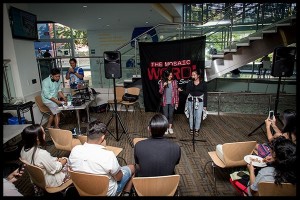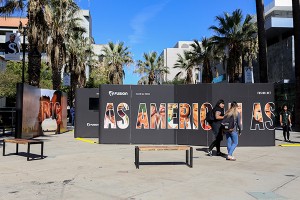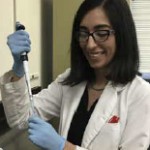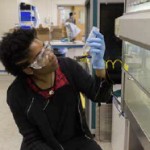SJSU student Cotton Stevenson, ’16 MA Intercultural Communications, developed a documentary, “Diversity University,” as a series of personal conversations with people who have been a part of the fabric of SJSU including faculty, staff, students and alumni.The narrative includes reflections of how individuals came to San Jose State and their experiences as part of the Spartan community. The documentary was screened on campus Sept. 26 at the Martin Luther King, Jr. Library.
Category Archives: Diversity, Inclusion and Global Citizenship
October 2016 Newsletter: Faculty Fellows Support PRIDE and MOSAIC Centers

Photo: David Schmitz
The MOSAIC Cross Cultural Center engages with a variety of workshops and activities, including an open mic event from fall 2015.
For the first time this fall, San Jose State University has four faculty members embedded as fellows at the MOSAIC Cross Cultural Center and the PRIDE Center. The faculty members will be working closely with the student populations who are supported by both centers while conducting research to find ways to create a more inclusive and welcoming environment at SJSU.
Erica Boas, an adjunct faculty member in the College of Social Sciences’ Sociology and Interdisciplinary Social Sciences Department, is one of three faculty members working with MOSAIC Director Hyon Chu Yi-Baker and student diversity advocate interns. The other fellows include Funie Hsu, an assistant professor of American Studies, and Manolo Callahan, a Mexican American Studies professor.
“It’s a great way to work with undergraduates,” Boas said, noting that she appreciates the diversity reflected in the student population at SJSU. “I am looking forward to getting to know the students and working with them on social justice issues and activism.”
Boas’ particular areas of interest include sexuality and race. Each faculty member will work closely with the diversity advocate interns and undertake a research project around diversity.
“There is a lot of potential at this place right now to go deeper and use our centers on campus that fill an authentic need given some of the hate speech that has been overt on campus,” she said. “MOSAIC hopes to create honest, deep discussions around these issues, so people have a place to go to talk about them.”
Boas grew up in “pre-gentrification San Francisco.” As a university student, she was interested in race and sex education, how identity influenced politics and how people live together. Around 37 percent of SJSU students identify as an underrepresented minority (Black or African American, Hispanic/Latino and Native American) and the university was recently ranked as the 14th most racial and ethnically diverse four-year public university in the U.S. by the Chronicle of Higher Education.
“We are meeting with the students twice a week for office hours,” she said. “We are organically getting to know them.”
“It’s very new, but it’s exciting,” said Jenna Edra is a second-year social work student who works at MOSAIC, of the Faculty Fellows program. “They are going to help with the program and diversity advocates.”
In addition to the research, the Fellows will be helping interns to plan workshops for other students at the university. The activities will be posted on the MOSAIC website.
“It’s great being with the students as colleagues, as opposed to being with them as a professor or teacher,” she said, noting that professors set the agenda in their classrooms. “We are meeting the students where they are in an authentic way.”
Stephanie Preston, a counselor in SJSU’s Counseling and Psychological Services department, is a Faculty Fellow at the PRIDE Center. When she became a faculty counselor in 2014, she was encouraged to get to know the cultural centers on campus and she got involved with the Peers in PRIDE program that supports lesbian, gay, bisexual, transgender and queer (LGBTQ) students.
Preston is spending eight hours a week at the PRIDE Center where she is continuing to connect with students. But she is also working closely with PRIDE Center Director Bonnie Sugiyama to create a needs assessment for LGBTQ students that will help pinpoint ways to make the campus a more welcoming space.
“The last assessment was conducted in 2008 before there was a PRIDE Center,” she said. “There was only a student group, so it was a very different landscape.”
Sugiyama noted the results of the previous reviews, conducted by a faculty counselor, provided the basis for creating the PRIDE Center and the Peers in PRIDE mentor program.
“We haven’t done another study to see what people’s needs are now – what they are looking for that they don’t see,” Sugiyama said. “It really takes a lot of time to go through the Institutional Review Board (to conduct research), so it’s really helpful to have a faculty fellow dedicated to it.”
Sugiyama indicated the goal is to use the results of the needs survey to create a strategic plan for the campus that will enhance support services for LGBTQ community members. In the American College Health Association’s National College Health Assessment from 2012, about eight percent of SJSU students who responded to the survey identified as gay or lesbian, bisexual, transgender or unsure of their sexual orientation.
While Preston is hard at work developing an assessment tool for the campus survey, she especially enjoys connecting with the students who visit the center.
“I like hanging out and overhearing their conversations,” she said. “I can introduce myself to the students.”
Sugiyama noted it was important to select a Faculty Fellow who has experience with the community.
“People in this community are astute to whether someone knows their issues,” she said. “They need that to feel safe. It helps to have another person to make sure everyone feels welcome and accepted in this space.”
Like the MOSAIC fellows, Preston will also be working with students on programming. She is hoping to create a mixer or event where students can interact with LGBTQ faculty and staff.
“One mission is educating the campus,” she said. “We can make less supportive environments better.”
October 2016 Newsletter: Provost Update – Our Differences Make Us Strong

Fusion Network’s “As American As” national campus tour at San Jose State University in San Jose, CA, on Thursday, October 6, 2016. (Photo: Christina Olivas/San Jose State University)
During homecoming week, many of you may have seen an interactive exhibit outside the Student Union on the Seventh Street Paseo. The walls of the “As American As…” display, sponsored by the Office of Diversity,Equity and Inclusion, depicted photographs of many people from different backgrounds and described them all as American. The larger-than-life piece created a maze of sorts in the middle of our campus for students, staff, faculty and community members to walk through as they considered how the portraits displayed disparities while the words reinforced their similarities.
When students, staff, faculty and members of the public engage at San Jose State University, they all become Spartans. We are strong because of our differences, and we are part of a diverse community that is striving to create a welcoming and inclusive environment for all. I am pleased to have our new Chief Diversity Officer Kathy Wong(Lau), who oversees the Office of Diversity, Equity and Inclusion, as a partner in our ongoing efforts. She has already begun to lead discussions around tough issues such as sexual harassment and sexual assault, hate speech versus freedom of speech and how to foster cognitive empathy so that people can have a difference of opinion while still understanding the perspectives of others.
As Provost, I am proud to be part of a multi-faceted campus community. SJSU was ranked No.14 among the most ethnically and racially diverse four-year public universities in the United States and No. 1 for highest international student enrollment at a master’s granting university by the Chronicle of Higher Education. Our diversity makes us strong, and we need to leverage that strength as we improve student success. We are making strides with underrepresented minority students through our African American andLatinx/Chicanx Student Success Task Forces. Our identity-based resources such as the PRIDE Center, the MOSAIC Multicultural Center, Military and Veteran Student Services and others have a centralized space in the newly renovated Student Union. We are devoting funding this year to establish an Immigrant Welcome Center that will support our undocumented students.
But we still have work to do to make meaningful changes in our graduation rates and to eliminate the achievement gap between underrepresented minority students and their peers by 2025. Research has shown that underrepresented students perform better in courses taught by diverse faculty for a variety of reasons including relevancy of experiences and perspectives in translating conceptual ideas, inclusion in curricular content at macro and micro levels, higher use of interactive pedagogies, role-modeling and approachability. As with many public universities, our faculty does not reflect the perspectives, experiences, and same diverse proportions that make up our student body. I am working closely with Dr. Wong(Lau) to identify immediate measures and to create a long-term plan to ensure we recruit the best candidates from a diversified pool of applicants and build capacity amongst all of our faculty to educate all of our students.
Dr. Wong(Lau) along with Shawn Spano, hosted the first “Conversation on Campus Climate” in September. I encourage you to attend the second “Conversation on Campus Climate” on Nov. 21, from 10 a.m. to noon, in the Diaz Compean Student Union Theater, when participants will help identify actions we need to take to make our campus more inclusive and welcoming. If you are unable to attend in person, share your insights with her via email to diversityoffice@sjsu.edu.
Other events include The Peter Lee Memorial Lecture Series on Nov. 7, from noon to 1:15 p.m., in the Student Union Theater, with a lecture by Dr. Janet Bennett, executive director of the Intercultural Communications Institute on “Intersecting Pathways: Global Diversity and Inclusion”; Faculty Intergroup Dialogue Facilitation and Inclusive Pedagogy Institute on Dec. 2, (location and time to be determined); and through Dec. 1 the “Photovoice Exhibit on Anti-Semitism and Islamaphobia” will be on exhibit at the MLK library. This exhibit features the photonarrative work of Ed Mamary, a professor in the College of Applied Sciences and Arts Department of Health Science and Recreation.
We are all partners in creating a more welcoming and inclusive environment on our campus. I look forward to continuing our work together this year.

Andy Feinstein
Provost and VP for Academic Affairs
SJSU Student Researchers Recognized by CSU
- Fauna Yarza
- Cynthia Ouandji
The California State University Louis Stokes Alliance for Minority Participation (LSAMP) Program Recognizing Outstanding Undergraduate Distinction (PROUD) honored two San Jose State students and two alumni in its most recent edition. The publication summarizes the work of the LSAMP program statewide to support underrepresented minorities in pursuing degrees in STEM while also acknowledging outstanding scholars at each CSU campus.
Fauna Yarza, a biological sciences student with a concentration in microbiology, received the Outstanding Academic and Research Award. She works with Professor Elizabeth Skovran as an undergraduate research assistant. She is studying a bacteria that has the potential for use in biofuels and biodegradable plastics and presented at the Annual Biomedical Research Conference for Minority Students last year, where she won an award. While working in the research lab, she has maintained a 3.75 GPA in her courses and plans to pursue a doctorate in microbiology.
Cynthia Ouandji, a biomedical engineering student, also received the Outstanding Academic and Research Award. She works in a microfluidics lab and is a member of the Tau Beta Pi Engineering Honor Society. She has pursued multiple research projects including one that involves synthesizing a cost-effective silver-based antimicrobial compound. In 2015, Cynthia was one of ten students accepted into the Summer Program Undergraduate Research in the Life and Biomedical Sciences (SPUR LABS), conducting research in the Cardiac Computing lab.
SJSU alumnus Jose Alvarez, ’15 Biomedical Engineering, received the Outstanding Alumnus Academic and Research Award while Beatriz Camacho, ’15 Biochemistry, received the Outstanding Alumna with a Compelling Personal Story Award.
Campus Community Invited to CSU Teaching and Learning Symposium
San Jose State University is hosting the 2016 California State University (CSU) Teaching and Learning Symposium, Oct. 21 and 22. Faculty, students and staff are invited to attend. The theme this year is “Promoting Student Success Through Innovation, Creativity, Diversity and Teamwork.”
Registration for the conference is $50. The Office of Diversity, Inclusiveness and Equity has offered to cover the cost of attendance for the first 30 community members who respond to the Center of Faculty Development invitation to register. Call or email Gina Marin at gina.marin@sjsu.edu or call 408-924-2303 for more information.
Conference registration is available online and the $50 fee includes:
- Hands-on workshops, pre-conference sessions and a welcome reception, on Friday, Oct. 21, from 10 a.m. to 6 p.m.
- A keynote address by Kathryn Plank, Otterbein University, as well as dozens of symposia, paper sessions, posters and lightning talks, on Saturday, Oct. 22, from 8 am. To 4:30 p.m.
- Meals and refreshments both days.
The conference is open to participants from all 23 CSU campuses. Attendees will have a chance to talk with colleagues from throughout the CSU as well as other higher education institutions. Visit the conference website for more information or contact Gina Marin with questions (gina.marin@sjsu.edu or 408-924-2303).

